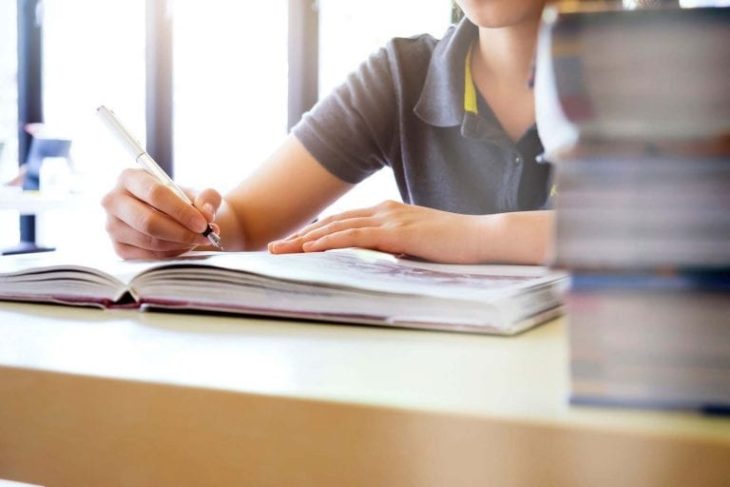Are your exams around the corner? Do you have too much syllabus but less time for exam preparation? Then, it can be very stressful for you. However, with a proper study plan and starting the test preparation early, you would not have to be anxious about the upcoming test.
Top 5 Best Tips For Easy And Quick Exam Preparation
Here are the five most effective exam preparation tips that are beneficial for any student preparing for an upcoming test.

Source: AdobeStock
1. Make A Study Plan And Start Preparing Early
Make a study plan before you begin studying. It will assist in maintaining a decent study strategy and also in gaining a better understanding of what you need to learn and when. Write the subjects and topics for which you need more time to understand. Check the number of days until the exam and allot time to each subject strategically.
Following a proper study plan will lead the way and help you save time and energy that you may waste worrying and stressing about the test. Allot plenty of time to go over your running notes along with the lecturer’s notes. If you need help writing essays on any topic, you can reach out to the EasyEssay service.
For example, if you need to study and revise notes for a whole semester, you should begin preparing a few weeks ahead of the test. If you are only taking an exam that covers only some chapters, starting the preparation a week or even three to four days before the exam will be enough.
You are the one who will be studying and writing the test, so only you can know how long it takes you to memorize the information. Begin early preparation if the subject is particularly challenging for you. Allow enough time to thoroughly understand the content, practice it, and revise it.

Source: dudelol.com
2. Organize The Study Space
Generally, when we study in a decent and comfortable atmosphere, we have more potential to concentrate and learn the notes better. Therefore, it is best to discover a good area in your room that has enough lighting, fresh air, and most importantly, quiet. The best places to study are those with the least amount of distractions. In order to avoid disturbances, clear up the study space as much as possible by removing needless stuff.
While studying, switch off your mobile or put it on flight mode. People have varied tastes and sitting habits when it comes to studying. Some students choose to learn while sitting on a stool and reviewing at the study desk, and others might like to prepare while walking with a book or lying on the floor. As a result, determine the ideal approach and space for you and plan accordingly.

Source: Slovenskenovice.com
3. Establish Study Goals And Work On Old Exam Papers
Establish a purpose for every study session in order to keep track of how much and what you are learning. You can write down your study objectives right before the beginning of your study session or select new goals for the next round when you are done with your current session. If you want to see, here are a few study objectives you can make:
- I will solve at least 10 problems in the next hour.
- I will revise two chapters by the end of this session.
- I will go through the lecturer’s notes.
One of the best beneficial strategies to prepare for the tests in a better way is to review and practice old exam papers. It assists you in becoming familiar with the question paper’s format and structure. If you can, set the exact time interval as per the test while practicing the old exam paper as it will support you to figure out how much time you spend on each part. Past exam papers can be obtained via your lecturer, the university library, or the internet.

source: pyramideservices.com
4. Study As Per Your Learning Style And Use Flowchart When Necessary
Your learning style will assist you in determining the most effective strategies to study for the upcoming test. For instance, if you are an auditory student, you can find it beneficial to record your notes and then hear to them afterward, or you could listen to the recordings of your teacher’s notes.
However, if you are an optical learner, pictures and diagrams can assist you to memorize the notes. In order to begin, start noting everything you know about the topic and shorten those notes into a one-page chart, making it easy for revising before the exam. So figure out what learning style you are comfortable with so that you can learn critical facts and comprehend vital topics quickly.

Online education.com
5. Study Sessions With Your Friends With Regular Breaks And Healthy Diet
Creating study sessions with your friends is a crucial exam preparation tip because it allows you to acquire answers to all of your questions and vice versa simultaneously. But, you have to make sure not to waste your time discussing unnecessary stuff during the group study sessions.
Though many people believe that studying for longer periods of time will increase productivity, it is not true as it will drain you, which leaves you without any energy to learn further. As a result, it is critical to get regular breaks to ensure that you memorize information and refresh your mind.
Make sure you drink plenty of water. Eat nutritious meals that can enhance attention and memory like almonds, fish, blueberries, seeds, and yogurt to keep your body and brain fresh. On exam day, have a good meal before going to take the test. If possible, try to avoid sugary foods as sugar might taste good, but it will deplete your vitality within an hour.
Bottom Line
If you want to ensure the best preparation for your exam and want to get a better score, then it is recommended to follow the above-listed tips. While preparing for the exam, start early, check the syllabus, go through the vital topics first, revise after every study session, take regular breaks, plan group study sessions, eat nutritious food, and have a good sleep.
